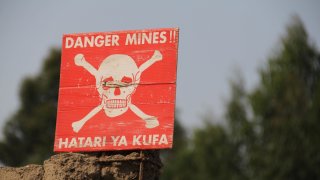How Kurdistan Can Help Congo
Dealing with Congo's central government may no longer be enough to prevent the slide toward another conflict.
Today, much of the narrative surrounding eastern Congo focuses on the humanitarian plight of refugees and displaced persons fleeing the fighting. Here, too, there is a similarity with Iraqi Kurds. In 1991, the Americans, British, and French, with Turkish support, launched Operation Provide Comfort to protect Kurds fleeing Saddam’s onslaught and to carve out a safe haven for them in northern Iraq. It was a much more moral solution than forcing Kurds to submit themselves to Saddam’s whims and revenge. Freed from the immediate threat of Saddam’s vengeance and enjoying a modicum of stability, Iraqi Kurdistan grew and thrived. While its current leadership risks what the Kurds have achieved through corruption and greed, for its first two decades at least, Iraqi Kurdistan outperformed the rest of Iraq.
This can be the blueprint for eastern Congo. Tshisekedi has opened the door to constitutional revisions by hinting he wants a third presidential term. Without conceding to that demand, his willingness to amend the constitution provides an opening to amend it to allow a federal solution in eastern Congo. This need not lead to separatism as the region is not monolithic but rather has a patchwork of ethnicities, none of which has a majority. Nor is constitutional revision necessary in the short term. Iraq did not formalize its own federalism until 2005, two years after Saddam’s fall.
Rather than demonize M23, the United States and the international community should recognize its reality and its natural role as the core of a new government. International officials should work with the group to build capacity and develop a broad-based regional government to collect revenue and fund public works with transparency. Rather than prevent internally displaced people or refugees from returning to M23-administered territories as the international community now does, they should facilitate their return. Reintegration is already underway for those displaced who avoid the DRC army and FDLR checkpoints to return to their homes. Eastern Congo federalism could also advance peace by creating a buffer between Rwanda and Uganda on the one hand and the DRC on the other to head off what appears to be a march to war.
The definition of insanity is doing the same action repeatedly but expecting different results each time. It is time for the United Nations and the United States to stop this insane approach, which has poured billions of dollars into Kinshasa and international NGO pockets without positive outcomes, especially when another model exists.
Michael Rubin is a senior fellow at the American Enterprise Institute.
Image: bmszealand / Shutterstock.com.

